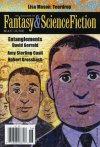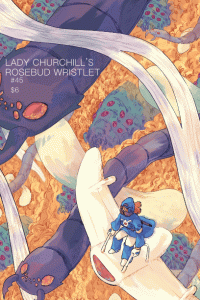Lois Tilton reviews Short Fiction, early April
I manage to sift out some good stories this time, most noticeably in Clarkesworld.
Publications Reviewed
- F&SF, May/June 2015
- Clarkesworld, April 2015
- Lightspeed, April 2015
F&SF, May/June 2015
Regular readers of this magazine will be aware that despite the presence of a new editor onboard, there is still a lot of existing inventory stored in the hold. Some may wish to entertain themselves speculating as to which fiction originated with which editorial regime. I’m not attempting to make such identifications myself, but I do hope that future issues won’t too much resemble this one.
“Entrepreneurs” by Robert Grossbach
Opening in 1952, this piece of retro-fiction could easily have been printed at the time, saving a few minor details. Only in 1952 would there be a girl named Lois, who grows up to become the loyal wife of our protagonist Morty, whom we find soldering the connections of his first crystal radio, on which he hears a brief transmission from alien entrepreneurs looking to exploit the cheap labor of Earth. Morty grows up to be exploited by a succession of mean earthling bosses and yearning to achieve more than he has. After several failures, the fated connection is made.
Comedy, at once cynical and farcical, particularly when involving the aliens, of the silly variety. At the center is a critique of capitalist economics, with a strain of the pathetic, as Morty has to wait until almost the end of his life before achieving the success he’s always dreamed of. Since Morty is a good and honest guy [which is why success has eluded him] this is sad. For nostalgia-lovers.
“Teardrop” by Lisa Mason
Based, according to the editorial blurb, on the Massive Attack song. The piece begins in alien incomprehensibility from the point of view of a local, NanaNini, working as a bartender in the joint where the humans come looking for her human lover, who has gone native with a vengeance. From him, we learn that humans have come, as usual, to exploit the world’s resources and enslave its population, but Dixon, in charge of the process, has seen the light, which is to say, the air.
Under Policy, the natives of XYK-834 are classified as Grade 12 primitives clinging in barbaric innocence to their wildly beautiful mountaintops. The mountains soar high above a dense lower atmosphere so thick and turbulent you can — with a coldsuit and a long, slim board made of laminated stalks of a local vegetation called wiliwili wood — float and career atop the swooping gas currents. Till the currents tumble you, breathless, on the flanks of the tallest mountaintop the lokes reverently call Mother Bu.
For all the imagination gone into the setting, the basic story here is a same old one, a sad one, the song a lament.
“Entanglements” by David Gerrold
A “thematic sequel”, says the editorial blurb, to the author’s award-winning “The Martian Child”. Which means . . . What? Both stories are autobiographical fiction, with narrator and author not clearly distinguished. But “The Martian Child” is a story about something the narrator did: adopting a son and the consequences this had in his life. “Entanglement” is at its heart about what didn’t happen: a void in his life and its consequences; the narrator is the passive observer of events that never took place.
That, however, isn’t the real problem with the piece. The real problem is that it’s 30 pages long, and for the first 2/3 of the text, the narrator is just gibbering. At one point, he describes himself staring at a blank screen, blocked, and filling in the empty space with pointless dithering. That’s this story, as if the author couldn’t get around to actually writing it. Instead, there are long blithering descriptions of a despised acquaintance, a party, cleaning up from the party, and a giraffe, until the despised acquaintance holds up a skiffy gizmo and takes over the gibbering temporarily with jargon like: “This is a trans-dimensional parallelithonic resonating transceiver. It contains a 64-core multi-fractal array of entangled particles. Call it a quantum empathizer for short.”
Finally, at last, we get to the point: the gizmo identifies all the points of divergence in the narrator’s life where it would have gone differently, if only. It gives him the history of all these alternate selves, including the works they have authored. Some of these are worse, some better, in different respects. The narrator repines, “Somewhere else, I had the life I’d planned. Here, I had the life that had happened anyway.”
These are painfully moving personal revelations, uncomfortably so, when we reflect how very closely the narrative line follows the author’s own life. He’s sharing a lot with us. If only he’d gotten on with it a lot sooner instead of evading the confrontation for so long.
“Trapping the Pleistocene” by James Sarafin
What the title says, after some backstory. We’re in a future when most of humanity [the North American part, at least] appears to have retreated to towers where they communicate directly through brain implants. In the relative absence of human habitation, wildlife has rebounded, aided by programs to repopulate native species. This allows people like Jack to make a living hunting and trapping; there are “cultural” enclaves in which retro populations [although slightly advanced from our current level of tech] are allowed to live and maintain their primitive ways of life. Now the government intends to reintroduce extinct species from the period before humanity entered the continent; time travel makes this possible, but they need people with obsolete skills like trapping to acquire specimens. They’ve already sent Jack’s buddy Hank back to the Pleistocene for giant beaver, but Harry has gone missing; Jack agrees to go after him.
Essentially, this is a neat wilderness adventure in a real wilderness; the Pleistocene is known for its megafauna. There’s good stuff here.
He was passing upwind of a grove of aspen when he startled some huge animal. Maybe it was his unfamiliar smell or the clink of steel in his pack. All he could see at first was a moving patch of long-haired, light-brown coat. Brush was snapping and treetops shaking as it made its ponderous way down toward the river. It broke into a clearing on the riverbank and turned to look back toward him.
Jack makes it clear that he thinks the government is foolish in this project and naïve about the potential consequences. Although the author seems to agree, we don’t really get enough information about the tower setup to judge. How, for example, do they produce their food? We see farmers in the enclave, but it’s more likely that they only trade among themselves than that the towers depend on actual agriculture. We also get no information about conditions in other parts of the world; while this doesn’t impact the story at hand, it makes me curious.
Problems: The author establishes early that Jack has a bad knee; a knock from a cleaning bot sets it off. Now Jack is out there in the past humping a wood-frame pack, a duffle, traps and a rifle, across a lot of uneven terrain; he has wrestling matches with oversized carnivores. Not a twinge. Bad knees are a matter of familiarity to me, and I’m not buying this. I’m also not liking the dead ten-year-old daughter the author has thrown in for sentimental effect. But for many readers, the issue here is going to be the trapping scenes, and it may make little difference that Jack and Hank are ethical trappers, within those parameters. I do think there is irony in the notion that the Pleistocene megafauna could turn out to have been exterminated by time-travelers attempting to restore the extinct species.
“The Laminated Man” by Albert E Cowdrey
Mystery/horror. Cairns is an FBI agent investigating the death of a con man who was last seen alive under mysterious circumstances by his building’s security guard.
Christian stood for a few minutes under the building’s green canvas canopy while Nip opened locks at the top, left-center, and bottom of the door. He was straightening up, puffing, when a sudden wind struck the canopy, making it flap wildly, even pop loose from its metal frame in two places. Christian looked to his right (Nip’s left), his mouth fell open, and he stiffened “like a guy been knocked silly but ain’t fell down yet.” Then — with the guard at hand, the door unlocked though not yet open, and the well-lit lobby only a few yards distant — he turned and ran the other way across Central Park West, where two screeching cabs almost nailed him.
This description is an exception. For an account involving multiple gruesome murders, this one is decidedly dull for most of its length, like paging through the officialese of police reports as Cairns plods along investigating, interviewing, and conjecturing. The author lays out the facts, but it’s up to readers to do most of the work of making a story from them.
“Today’s Smarthouse in Love” by Sarah Pinsker
Sentient houses again. It’s hard to do something original with this trope. The slight piece here makes me think it’s a good thing houses are actually dumb.
“Four Seasons in the Forest of Your Mind” by Caroline M Yoachim
The narrator is an entity, part of the invasive Omnitude that has assimilated the native organisms of this planet and other colonist species. It has taken up residence in the brain of a newborn human colonist and cultivates her neurons, pruning and training. At first, this activity might seem benign, but eventually we learn otherwise, when “you” see something the Omnitude does not wish you to consider.
We trim dendritic branches and strip myelin sheaths from axonal roots. We prune your thoughts and memories. When you return to the colony dome, all that remains is a sense of awe at the unending lightning.
The forest makes a natural metaphor for the structure of the brain. I liked the piece better before the purpose of the parasitism was revealed, which proved to be less interesting and original.
“In the Time of Love” by Amy Sterling Casil
When a story, such as this one, comes with a personal dedication, we can assume it has some special meaning to the author, not necessarily detectable by readers. The rest of us, however, may find no reason to appreciate this piece about a scumbag who uses the time-stopping device designed by his wife to screw around with his skanky girlfriend, while the wife is working to support him.
“A Turkey with Egg on His Face” by Rob Chilson
Georgie Plunkett is in love, and his design to win the fair Chloey involves building her a brick bread oven. But his design is in jeopardy.
Harry Markesan just laughed his bluff manly laugh. “Naw, naw,” he said. “I’ll do it. I can do a lot better job than you. And,” with a wink and a tchk-tchk, “she’ll be grateful that a big well-set-up man like me done her such a good deed.” And he smirked the smirk of the complacent male beast.
Fortunately for Georgie, he has a secret weapon.
Here’s a good example of a story that rests primarily on the narrative voice. Although there are some strong characters here, particularly the deputy sheriff, the tale’s success is in the telling. I do have to express my doubts, however, that a baker would be happy to substitute ostrich eggs for the usual henfruit in her cake batter.
Clarkesworld, April 2015
A couple of fine stories this time.
“The Empress in her Glory” by Robert Reed
Another thought-provoking story from this author. It would be inaccurate to say that Earth has been conquered, as conquest implies a conflict. Instead the world has simply and unobtrusively been taken over by aliens. To control it efficiently, they chose a human representative, who at first had no idea what was happening.
Waking at ten after five, as usual, she discovered e-mails and classified reports from mainland China. Asking for origin reports, the new software told reasonable lies about failures to encrypt and a nameless hacker who must have left her cleverness sit exposed for too long.
Adrianne Hammer was an analyst and a blogger; in both capacities she focused on future trends. Now her analysis has become predictive to a new degree. As she realizes the extent of her power, she discovers the ability, on some occasions, to dictate events as well as foretell them; it isn’t always possible to know which.
“Nothing about this is reasonable,” Adrianne continued. “But this world is built on unreasonable coincidences. Until we understand what’s happening, I’m going to be the Empress of Everything. And for as long as I have the job, I should at least try to do my best.”
This is political/economic science fiction, exploring the ways certain factors might be controlled to produce certain results. It’s also a story of character, considering the sort of individual who might be trusted with such power, and how she might wield it. A number of points are noteworthy: Adrianne seems to pay little attention to the possible extent of her power, rarely testing it. She does essentially what she said she would, try to do her best. These are likely qualities that we might want in an Empress. But what she doesn’t know, and we don’t, is what the aliens actually want. Are they benevolent rulers, attempting to do their best for the world? Or for themselves? Did the aliens merely predict the catastrophic dam failure in China that killed millions, or did they cause it? Did they consider this cost necessary for some greater good, or was it simply to make the people of Earth pay attention? And what kind of human can cope with the uncertainties involved?
I do have to wonder, if Adrianne is so wise, how she managed to choose so poorly when it came to a mate. But perhaps she learned better, once it was too late.
–RECOMMENDED
“Let Baser Things Devise” by Barrien C Henderson
Pierre is a chimpanzee who was abducted from the wild as an infant, then subjected to uplifting techniques that have now earned him official personhood and autonomy. He reads Elizabethan poetry and has now gone to the moon, where he discovered the bodies of two previously lost astronauts, giving him a greater measure of fame. But Pierre is lonely and isolated, his best friend a sentient robot. He’s haunted by dreams of his former life in the jungle.
This is a fine, poignant psychological portrait of an individual trapped in an ambivalent state, neither fully chimpanzee nor human. While Pierre yearns for a return to the jungle of his birth, he is aware that he can never really become what he was or might have been. He has been irrevocably altered by humans who considered him an experiment, a tool. His capture, his treatment in the lab, were nightmarishly traumatic when he couldn’t understand them, but worse in another way once he could. Sentience itself was a torment, and the presence of implants in his brain makes him constantly susceptible to headaches.
The real nightmare, the waking one, happened when he fell asleep and woke to the reality of his uplifting and a flood of information, a cascade of new schema expanding exponentially—the synaptic flood churning and frothing in his mind from the cerebral implant. He understood the cries of the other animals the way an adult understands a child’s cries—a mixture of sympathy tinged with the patina of intellectual distance.
The story is a strong ethical work. To the humans he works with, Pierre is a fortunate case, being in many respects as good as human. It doesn’t seem to occur to them that being human is not necessarily a good, or that Pierre was never given a choice in the matter. His personal autonomy has been irrevocably violated. Many of his problems are the consequence of his exploitation by his employers, formerly his owners. His trip to the moon was a PR scheme, and his discovery of the Apollo 20 astronauts may also have been manipulated. While he is compensated, we have to wonder what would happen if he refused to cooperate.
Perhaps his primary personal problem is isolation, but this, too, is a problem. There are other uplifted apes in the world, but he seems to be uniquely privileged. He’s glad to be part of the space program instead of working in recycling, as most of the others do, but this deprives him of the possibility of companionship and perhaps mates. The story neglects these possibilities, turning instead to the impossible dream of the jungle.
–RECOMMENDED
“The Petals Abide” by Benjanun Sriduangkaew
If readers hack through the accretion of verbiage here, they will encounter an artificial entity calling herself a memorialist, whose instructions materialize as petals in her mouth—a grotesquely pretentious notion in keeping with the exotic, decadent, and affected setting. The memorialist is instructed to revive an assassin from a heap of bones and similes.
The edges of [the casket] are sharp as invasion, its casing radiant as war-beads, its lid heavy as regret. Around this a homunculus of encryption hovers, epidermis full of paradoxes clenched shut. She coaxes them open, by intuition and determination.
This done, a relationship between the two entities ensues.
The function of prose should be to tell a story, not obfuscate or upstage it with flashy effects. Here, the story weighed down by the ornate layers of overdone imagery is a purported romance without real feeling, its characters little more than contrivances, though if we look closely, we may discern a monster.
“Postcards from Monster Island” by Emily Devenport
Somewhere in New York City, a monster wades onshore, causing general destruction, panic and evacuation. The narrator doesn’t evacuate because she’s too sick, and some of her neighbors remain instead, witnesses to the futile attempts of the military.
They did no damage to Behemoth. But they did plenty of damage to our city. Just when I thought they would wise up and stop with the bombs, a troops of marines jumped out of an airplane and parachuted onto him. They bounced off too. When they landed, the ones who didn’t get tangled in their parachutes launched grenades at him. He turned and walked away from them, toppling several buildings that had been damaged by the bombs.
Then more monsters materialize.
A light, amusing take on Godzilla movies and other monstrous apparitions, always assumed by authorities to be mortal threats. This isn’t a new theme, not since klaatu barada nicto or, indeed, Frankenstein’s monster, but this is an entertaining take on it.
Lightspeed, April 2015
An unusually long piece from Dale Bailey this time, with the rest of the stories proportionally shorter.
“The Ministry of the Eye” by Dale Bailey
Dark dark fantasy. Gerst works in Acheron, as everyone does, in a white-collar position which he won by turning in his brother.
By the time Gerst found his cubby and shucked his coat, a woman—a gray, affectless specimen of the sex with whom he had never exchanged a word—had already arrived with a wheeled cart piled high with four-by-eight punch cards. Gerst would spend the rest of the day sliding them into the nine color-coded slots in his desk, each a different shade of red. The distinctions were subtle (they ran from rust to dried blood) and the work demanded his whole attention.
But one day he catches a rare glimpse of beauty—an oil slick in a mud puddle, which says something about the esthetic level of this version of hell. From that moment, his feet are set on a downward path, because in hell there is always a lower level.
At first, this seems a pretty conventional image of an industrial hell, the damned being herded into the burning pits, etc. But a twist at the end shows Gerst what suffering really means.
“Quiet Town” by Jason Gurley
The water is rising. The last remaining residents realize they can’t stay any longer.
This brief piece is a character study, a woman in denial who clings to normality as long as she can.
“We’ll Be Together Forever” by Joseph Allen Hill
You can tell things aren’t going well, when your girlfriend tells you, “Sometimes I just want very badly for you not to be so . . . you.” But this couple do some heavy-duty analysis of their dysfunctions.
This was a proxy argument. The real argument was about us moving in together. I had been passive-aggressively suggesting it was time for the past two months, and she hadn’t reacted well.
Anthony thinks a love potion might revive their relationship, after which, things get weird.
Amusingly demented. And weird.
“The Universe, Sung in Stars” by Kat Howard
The music of the spheres. A fantasy in which newborn pocket universes need to learn to sing in harmony, so they’re assigned guardians until they can sing on their own. Vera has a knack for stellar nurturing, so she adopts a baby universe, but she refuses to give up the waning white dwarf she’s been harboring, even when her mentor warns it will alter the newborn universe’s song.
It would be easy to dismiss this as absurd—people walking around with universes in their hair, shedding stars like dandruff flakes, but Howard makes it seem, if not plausible, quite charming. I will not, however, accept it as science fiction, no matter what laws of physics author invokes.






